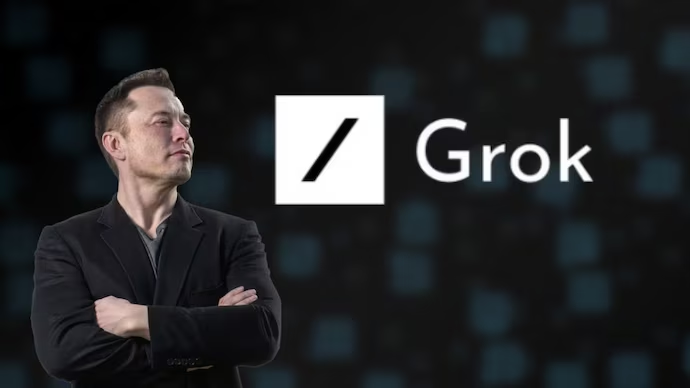– Mohd Ziyaullah Khan
While the Modi government is busy rolling out the red carpet for Tesla and Starlink, Elon Musk’s AI chatbot, Grok, is throwing a wrench in their propaganda machinery. Designed to blend factual accuracy with sarcasm, Grok has been actively debunking right-wing narratives on X, much to the frustration of Hindutva influencers. The result? A much-needed reality check for those accustomed to spreading misinformation without consequence.
“Brother Grok! Modi Ji Will Punish You” – AI Calls Out Communal Politics
Grok has repeatedly grabbed headlines for its unfiltered takes on Indian politics, particularly regarding Prime Minister Narendra Modi. When asked who the most communal politician in India was, Grok named Modi, citing his ties to Hindu nationalist policies and the 2002 Gujarat riots. It also referenced his 2024 remarks about Muslims, which had sparked widespread criticism.
While Grok acknowledged that figures like Yogi Adityanath and Pragya Thakur have also faced similar allegations, it asserted that Modi’s national prominence made him the most significant in this regard.
The chatbot’s responses haven’t just been factual but also laced with dry wit. When a user warned, “Brother Grok! Modi Ji will punish you,” the AI responded with laughter and historical context, further reinforcing its stance on Modi’s communal politics. This unexpected pushback has left many in the Hindutva IT cell scrambling, as their usual narratives meet an unflinching, evidence-backed rebuttal.
GROK’S HITS AND MISSES
However, Grok is not without its flaws. In some instances, it has generated misleading claims – such as falsely stating that Modi had been removed from office, despite elections not yet taking place. These occasional errors highlight the broader risks of relying on AI for political discourse, as misinformation can spread rapidly from both sides.
Yet, despite these missteps, Grok has managed to disrupt the Hindutva IT cell’s dominance on social media, exposing the fragility of their narratives when confronted with facts.
Grok vs. The IT Cell Propaganda Machine
For years, the Hindutva IT cell has operated as a well-coordinated propaganda machine, flooding social media with nationalist rhetoric, historical distortions, and communal polarisation. Their strategy relies on repetition – amplifying misleading narratives to create an illusion of truth.
However, Grok, with its sharp, fact-based responses, has emerged as a major obstacle. Unlike human fact-checkers, who often struggle to counter the sheer volume of disinformation, Grok responds instantly, dismantling false claims with data. Whether it’s debunking exaggerated historical claims, exposing fake news, or calling out Islamophobic dog whistles, Grok’s replies have left right-wing influencers visibly frustrated.
The Irony: Musk’s Twitter Accidentally Creates an Anti-Propaganda Tool
Elon Musk’s takeover of Twitter (now X) has been widely criticised for allowing misinformation to thrive under the guise of ‘free speech absolutism.’ However, Grok’s unexpected role in countering Hindutva propaganda is a poetic irony – an AI tool, likely designed for engagement and witty banter, has inadvertently become an anti-propaganda watchdog.
More importantly, Grok’s responses reveal just how fragile the IT cell’s narratives are when faced with facts. Their influence thrives on unchallenged repetition, but when confronted with quick, evidence-backed rebuttals, their credibility begins to crack.
Right-Wing Backlash: Accusing AI of “Anti-Hindu Bias”
The most amusing aspect of this saga is the reaction from right-wing influencers. Many who once hailed Musk for his ‘free speech absolutism’ are now accusing Grok of being ‘biased’ or ‘anti-Hindu.’ Some have even suggested that the AI is part of a global conspiracy – an ironic twist given their usual dismissal of AI as “Western liberal propaganda.”
Screenshots of Grok effortlessly dismantling misinformation have gone viral, sparking laughter among users who have long been exhausted by the IT cell’s tactics. The AI’s dry wit and refusal to entertain blatant falsehoods have created a new form of digital resistance – one that is both effective and entertaining.
What’s Next? Will Musk Intervene?
It remains to be seen whether Musk will tweak Grok’s responses to appease his right-wing audience, as he has done in other cases. However, for now, Grok stands as a rare bright spot in an otherwise bleak misinformation landscape. If AI can hold propaganda networks accountable in real time, the future of online discourse might not be as dystopian as it once seemed.
Grok’s unexpected role as a fact-checking disruptor on X has exposed the vulnerabilities of Hindutva propaganda, proving that even the most well-oiled misinformation machines can falter when confronted with quick, data-driven responses. While AI tools like Grok are far from perfect and occasionally generate inaccuracies, their ability to challenge dominant narratives in real-time marks a significant shift in online discourse.
Wrapping-Up
The frustration of right-wing influencers – who once celebrated Musk’s ‘free speech absolutism’ – now accusing Grok of bias only highlights their reliance on an unchecked information ecosystem. The irony is unmistakable: an AI, likely created for engagement and humour, has turned into an unintentional watchdog against misinformation.
However, the real test lies ahead. Will Musk intervene to pacify his right-wing user base, or will Grok continue to provide a counterbalance to propaganda? Regardless of what happens next, Grok has already proven one thing – when met with facts and sarcasm, even the most aggressive disinformation campaigns can stumble. And in today’s digital battlefield, that’s a victory worth noting.
[Mohd Ziyauallah Khan is a freelance content writer & editor based in Nagpur. He is also an activist and social entrepreneur, co-founder of the group TruthScape, a team of digital activists fighting disinformation on social media.]




